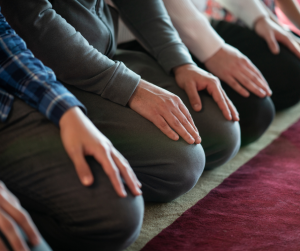Muslim school case must be thrown out of court
 Imagine a school that takes the poorest and most disadvantaged children and turns them into exam-passing, confident young adults who are fit, ready and motivated for the world of work.
Imagine a school that takes the poorest and most disadvantaged children and turns them into exam-passing, confident young adults who are fit, ready and motivated for the world of work.
Now imagine that the establishment – having failed to stop the school from opening in the first place – tries everything in its power to close that school.
That is happening in London, to the Michaela Community School.
Through the strict rules laid down by its inspirational headteacher Katharine Birbalsingh, and its emphasis on traditional teaching methods, it has transformed the lives of thousands of youngsters.
Poor parents are desperate to get their children into the school. Unlike middle class parents who can pay for tutors and exam retakes, their children get just one chance – and they know the Michaela Community School is their best hope.
One important aspect of the school’s culture is that every group makes sacrifices ‘for the sake of the whole’.
This ethos is proven to work. It is one of the reasons why the school is successful. It is rated ‘outstanding’ by Ofsted. In 2022 and 2023 its progress score at GCSE was the highest in the country.
It draws its students from a variety of different communities from around the Brent area of north-west London.
And it proudly flies the union flag because that is something every pupil has in common, no matter where they or their parents come from originally.
The teaching establishment hates the school because it flies in the face of their progressive shibboleths. It works better than their schools and they can’t bear it.
Now, one of the groups within the school has decided it does not want to make a sacrifice for the sake of the whole. It wants to be different and separate itself.
And astonishingly the whole miserable episode has reached the courts.
Ms Birbalsingh and the school’s governing body decided last year to ban prayer rituals. Dozens of Muslim pupils had been praying outside, using their blazers as prayer mats. The issue caused serious problems including, it is claimed, the racial harassment of teachers.
When something in a school is causing serious problems, it gets banned. Whether that is mobile phones, a new craze or particular clothing. Mass prayer rituals should be no different.
Before starting at the school all parents know that it doesn’t have a prayer room.
The school has previously had to disappoint those from other faiths including Hindus, Jehovah’s Witnesses and Christians who have complained about aspects of its culture or policies. The school won those battles.
But a Muslim student has now gone to the High Court to challenge the prayer ban.
Michaela Community School is a secular school and has no religious affiliations.
What if one of the pupils requested Roman Catholic Mass to be held in the school every week, or another student requested worship sessions in the school hall for protestant Christians?
While assemblies are held and often have a moral perspective to them, they are not tied to a particular religious dogma.
Secular schools are places of learning and not sites for religious observance.
Muslims can pray at any time outside of classes; the ritualised nature of their prayer should not mean they can disrupt the whole school.
Giving special considerations and rights to a specific group is against the principles of multiculturalism where everybody should be treated the same.
There should be no special provisions for any particular religious group.
It seems that those who are arguing that they are being treated unfairly and that this treatment is Islamophobic have missed the point.
They are requesting special provisions that override the principles of education in Michaela Community School.
There are schools in the UK with a religious focus and parents can apply to them.
In these environments it is accepted from the outset that there are some considerations with regard to religion.
But even in these environments there should be no compulsion or exclusion of any child because they follow a different religious faith.
As we live in a multi-ethnic and multicultural society, religious education in the classroom should be sufficient in a secular school.
Religious education should present a balanced understanding of all the major faiths so children can make up their own minds.
This form of religious education should also be available in faith schools. Just because a child goes to a school with a particular religious foundation does not mean they should be indoctrinated with the faith emphasis of that school.
Whether a school is secular or religious in its foundation it should promote tolerance, equality and the values of the UK as a whole.
If we are truly trying to be a fair and equal society then we must not allow the secular space to be captured by any religious groups.
I hope the court throws out this case and the school can continue to prosper by following the rules set down by its inspirational leader.
And who knows, one day the educational establishment will realise that Katharine Birbalsingh was right, and they were wrong.
But I won’t hold my breath…
Ends